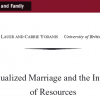Realities of Account Ownership
This post is a follow-up from my visualizations of account structures that couples use – different combinations of joint and separate accounts. I didn’t specify during that post, but there are actually three ways of viewing account/property ownership:
- the names on the account/deed
- how you think of the account
- the legal owner and beneficiary, in the case of divorce/death (will depend on the state)
 For example, I’ve talked with married couples who have individual names on various accounts but consider their money all joint. How they think of the accounts and the names on them are at odds, and the legal ownership in the case of divorce/death might go either way depending on their local laws.
For example, I’ve talked with married couples who have individual names on various accounts but consider their money all joint. How they think of the accounts and the names on them are at odds, and the legal ownership in the case of divorce/death might go either way depending on their local laws.
I would really advocate getting all three of these factors to align as closely as possible so that you don’t have any miscommunication or are caught off guard with death or separation.
The concept of the names on the accounts vs. how you think of them is easy to grasp, but the legal owner aspect is a bit more difficult and depends on which state you live in. I don’t want to get too deep into the legal stuff because I’m not a lawyer and I haven’t talked with anyone who actually knows about these sorts of things, but the following is my understanding based on a few minutes of internet research: Kyle and I live in an equitable distribution state, which means that assets and debts acquired during a marriage, aside from inheritances/gifts, will be (with rare exception) divided equally in the case of separation no matter who the owner is. So keeping separate accounts in name and in your money management model, aside from holding onto an inheritance, is pretty much a fiction in the case of separation in my state. Other states have other laws concerning these issues, the primary divide being between community property and common law states, and of course pre-nuptial and post-nuptial agreements may alter how the property is divided.
The biggest example of an account that can’t be aligned on all three of these axes is retirement accounts. Kyle and I both have IRAs – that we contribute to unequally – that are in our individual names because they have to be. Though we think of them as joint, the best we can do toward making them joint legally/in name is to name one another as the primary beneficiary. (Also, since named account beneficiaries trump wills in the case of death, remember to update your beneficiaries as soon as you get married or otherwise want to change who gets your money when you die!)
The difficulty in making these three aspects of account ownership align is one of the reasons why I think that couples should keep money completely separate prior to marriage (how they consider their money and the account names). Unmarried couples don’t have the automatic legal protection in their finances in the case of a breakup that married couples do in the case of divorce, so to be cautious they would have to draw up contracts to protect themselves.
If you are coupled up, how closely aligned are these three ways of looking at account ownership? Would you name your retirement accounts jointly if you could? How best can unmarried couples protect themselves in the case of a breakup? Do you know how your state views marital property?
photo from Free Digital Photos
Filed under: marriage, transitions · Tags: account ownership, breakups, divorce, joint money, separate money

 Joint and Separate Money Series: Changes During the First Year of Marriage
Joint and Separate Money Series: Changes During the First Year of Marriage Long-Distance Marriage: Money Management
Long-Distance Marriage: Money Management Diverted from the Slope
Diverted from the Slope Joint and Separate Money Series: Individualized Marriage and Money Management
Joint and Separate Money Series: Individualized Marriage and Money Management


I hadn’t even thought about changing retirement account beneficiaries as a way of making them more joint. I figured those were just inherently separate but come retirement we’d do our best to share!
I really have no problem viewing our individual non-retirement savings accounts that we brought into the marriage as joint funds, even though keeping them in the old accounts helps to keep the pots separate. For example, I built up my savings as an emergency fund, and it’s easiest just to let it sit as long as we don’t need it. It is important to talk about what you envision for these accounts, though.
Who is your retirement beneficiary currently? Of course if you are still alive and married you can share, but we’re talking about the other possibilities!
It’s pretty easy to add your spouse’s name to an old account just to make it officially joint! No need to migrate it anywhere.
I’m actually not sure who my retirement beneficiary is. It might be my parents – they set it up for me with the minimum contribution as a college graduation present. I should look into this.
It turned out it wasn’t that easy to add my spouse’s name to other accounts, though – my old accounts are at a small credit union in my hometown, and when we got married, it turned out we both had to be there physically in person to add him. We don’t visit my hometown much, and when we do it tends to be on short weekend and holiday trips when the bank isn’t open, so it’s something we’ve had in mind for a while but haven’t been able to take care of. (I used to work at this credit union and have always had great experiences there, so I trust them a lot and want to support them. Not being able to change accounts remotely is what made us go for a larger national credit union for joint accounts instead of starting our new ones at the local one, though.)
It might be your parents or you might not have one – check up on it! Changing mine from my siblings to Kyle was pretty straightforward with Vanguard.
That’s too bad that they don’t make through-the-mail exceptions to their account holder verification process!
My girlfriend and I have actual joint accounts, in which we are also each other’s beneficiaries if needed. As far as breaking up might go, we already talked about all that before we moved in together (and way before we go joint accounts) and made an agreement for what we’d do if a breakup happened. I guess that’s a bit abnormal for people our age (we were 19 and 21 at the time), but it just made sense.
Kyle @ Debt Free Diaries recently posted..The Perils of Cash and a Sick Girlfriend
The thing that I think about with breakups, especially of currently very committed couples (married or otherwise) is that in order to get to a breakup, something BIG would have had to change, and if something BIG changes, can you be confident that you with both still be in agreement about what to do with your assets? In the case of my marriage, we have agreed that the only sufficient grounds for divorce are the Biblical grounds (adultery or a non-Christian spouse abandoning the Christian spouse). So that means for Kyle and I to get to considering divorce, one of us would have to commit adultery or become an unbeliever and leave the other. Those things are so removed from our current realities as to be unthinkable – and if those could change, it’s certainly possible that our goodwill toward each other could evaporate as well. But if we ever DID get to that state, there are laws in place to protect each of us. And that’s what I’m concerned about for unmarried couples who pool money. Of course you don’t think that you’ll break up and you have a plan in place for the case you do. But given that you got to the point that you want to break up, as unlikely as you think that is, what is the chance that one of you will choose not to honor your plan? What would prevent you from taking more than half – especially if you believe it’s justified? Just food for thought.
All of or joint accounts have both or names on them Plus, I am an authorized name on her credit card.
Only my separate checking account stands alone and that is by design to protect our assets as much as possible from over-zealous creditors.
That said, joint accounts can be dangerous I’m the event of a divorce. I’ve known more than a few people to chine hone from work with their house, and their bank account, empty.
Edward Antrobus recently posted..Why the Internet Sales Tax is a Bad Idea
That is a good point about protecting assets from creditors! Will you guys make everything joint when you get out of individual debt?
Yes, that’s the plan. There won’t be any need for that checking account, so I will just close it.
Edward Antrobus recently posted..Why the Internet Sales Tax is a Bad Idea
We are in a community property state, so I just assume that whatever we make during our marriage will be split 50/50 (outside of inheritance/trusts, etc.). I’m fine with that arrangement, and haven’t really looked into what paperwork we need to do, if any.
Well Heeled Blog recently posted..My Tips to Having a Good Test Drive at Car Dealerships
It’s probably something you’ll want to look into if you ever move out of your community property state!
I guess I have never really put this much thought into it. My wife and I try to list everything as jointly as possible, and she mostly leaves the financial decisions to me. But we of course think of it all as “our” money.
My Money Design recently posted..Building My Money Earning Sites – Niche Website Update Part 5
You’re probably doing as best you can if you have listed everything possible as joint since you think of your money as completely joint. I hope your beneficiaries are in line as well!
We have each other as beneficiaries on our retirement accounts, but I don’t know if it would be necessary to create a joint retirement account, though probably easier to deal with if something were to happen.
Grayson @ Debt RoundUp recently posted..Money and Morality – How Much is Yours Worth?
I guess it depends on how you want to handle your money in retirement given that you practice partial pooling currently. If you wanted to keep the savings separate until one of you dies and just pool some of your withdrawals, definitely a joint account wouldn’t be useful for you.
We live in a community property state, so everything would be split 50/50. I have added my hubby to my retirement accounts as a beneficiary.
Sounds like you’re on top of this issue!
Are you guys in a covenant marriage? I can’t remember which states recognize them…
Liam’s mother is his beneficiary, and that won’t change once we’re legally married. I’m not sure whether I’ll ever name him, as mine because if we were to die simultaneously I don’t want his family to lay claim to anything that was mine.
I have no good advice for other non-married couples, because our financial situation is pretty unique. The way I look at it is that if we were to split up and I was left with nothing, I have a family who could easily absorb the burden of helping me rebound. His family has nothing and they are so tied up in his financial plans that even if there was bad blood between the two of us I wouldn’t want to deprive his family of anything, because each dollar matters to them.
Sara recently posted..Asset calculation, Spring 2013
No, not legally – it’s not available in our state. If we moved somewhere that it was legal and were able to switch it I would definitely consider it. But we do consider our marriage a convenant religiously.
You might want to look more into how you can name beneficiaries on your retirement accounts… I seems to recall there were degrees, so if Liam were your #1 I think you might also be able to designate one of your family members as a #2 if you and he die simultaneously. I’m not positive, though.
Your assessment sounds reasonable based on your feelings now, but what if you change your mind about being okay with Liam’s family getting your money – for instance, if they contribute to the reason for your breakup? After you get married (you’re engaged, right?) would you want your 50% or still be okay with walking away with nothing?
Yes, but you have a right to be skeptical without knowing many details That’s why I don’t offer advice to anyone else. They actually have nothing, and I will always have my degree/career (and family money, though I don’t talk about that piece).
Very true – it’s so difficult to know even your own relational dynamics fully, you can’t get a good picture from strangers over the internet! I do like things black and white and think that rules of thumb are very useful. If people think that exceptions should be made, that’s their decision! I just want individuals to think through these issues before making themselves vulnerable to their SOs.
[…] even added each other’s names to our vestigial accounts from before we were married. The only accounts that are not in both of our names are our IRAs (not possible, but we think of them as pooled) and some credit cards we applied for […]
[…] because there really is a lot of gray area. I delved into this a bit when I wrote about the realities of account ownership, which detailed the possible difference between how you might think of an account and how it […]
[…] other through job transitions or if one spouse needed or wanted to stop working. So why keep up the façade of separate finances before that […]